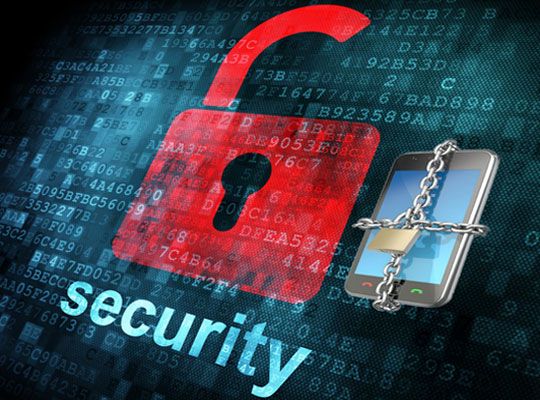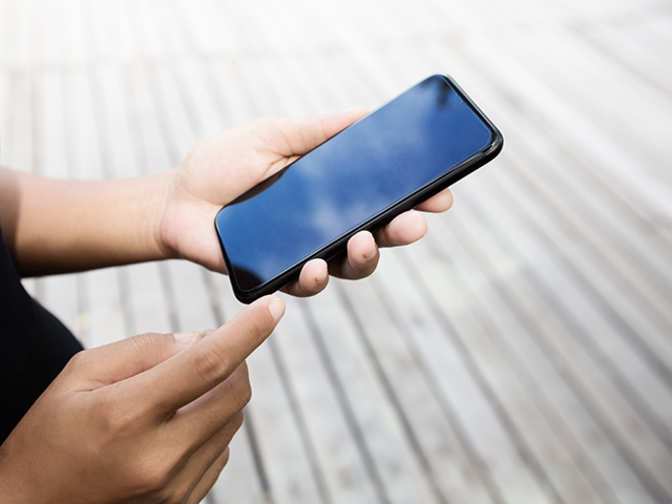Every day in the newspaper, we come across a number of reported smartphone cyber attacks. We use our smartphones to surf the web, shop, transfer funds online, to download applications and… the list just goes on. A study conducted by Lookout Security in 2012 among hundreds of smartphone users concluded that 4 out of 10 mobile internet users tend to click unsafe links. In another study conducted by RSA, smartphone users are 3 times more vulnerable to phishing scams than the desktop users. One main reason for the increased exposure to cyber attacks is the lack of awareness among mobile users to secure their online browsing activities. How many of us are aware that failing to log out from the social networking sites on our smartphones could pave way for hackers to gain entry and change our passwords and settings? That’s sounds scary, doesn’t it?

Here are 10 easy ways by which you can secure your smartphone from cyber attacks:
-
Use encryption, have a secured password
Smartphones – our friendly mobile wallets – are much easier to lose or steal. If it goes to the wrong hands, then chances are that the consequences could be extremely severe. To foresee the event of loss or theft, lock your personal information using the security options that are available in your phones. The moment you lose your phone and feel that the chances of recovering it are bleak, it’s best to deactivate your service by getting in touch with your telecom service provider.
-
Go for an all-new upgrade
Check if you are running the latest version of Operating system on your device. If not, upgrade it immediately. Not only the OS, also ensure that all the apps present in your system are also upgraded on a regular basis. This could help seal any loopholes in your phone’s software. Furthermore, this step ensures that any bugs in your phone has been fixed, thereby leaving only the slightest of chance for hackers to break into your device.
-
Create backups of your personal data
If at all you happen to find any strange response with your mobile, like temporary loss of already stored data or inability to store new data, then the first thing you should do is, create backup of all your important information including contacts, photos, videos, recordings etc. By connecting to a data card, you can transfer all the important information from your phone to your system. Or you can save it on the extra storage space available on your Cloud. This way, you will be able to ensure complete safety of your data even if your phone is lost or stolen.
-
Surf the web cautiously
It’s common that we tend to surf through hundreds of websites from our smartphones. While web surfing can be a useful activity, it’s important that you take the necessary steps required to protect your online privacy. Keep these things in mind:
- Try not to use internet on public Wi-Fi networks, unless you are too sure that your online activities are secured
- Prefer “https” sites to the normal sites
- Don’t give ‘remember passwords’ even if you are using your personal phone
- Turn off your Bluetooth immediately after its use is over
-
Be careful when downloading applications on to your phone
Always go for trusted sites when you are looking to download some app. For instance, the Amazon and iTunes stores are considered safer than the Android market apps when it comes to downloading. Sites with third-party sites are more vulnerable to malware and virus than the original mobile app sites.
-
Read the app’s privacy policy
No matter however reliable the site may be, it’s always good to check the privacy policy of the app before downloading them. This way, you ensure double safety for your phone when downloading apps.
-
Install ant-virus software
Any phone without comprehensive security software is prone to cyber attacks by default. When you are filling out your personal usernames and passwords or transferring funds online, it’s important that you secure your online privacy. Security software helps remove the any malicious software that tries to gain into your phone. It comes in handy especially when malicious software comes from an unreliable source like an adult site.
-
Go through FCC’s Smart Phone Security guidelines
Recently, FCC launched an all-encompassing security tool called the “Smartphone Security Checker.” Within just a couple of months after its release, experts recognized it as one of the best online security software for smartphones. It encompasses a 10-step process which you need to follow to install it in your smartphone.
-
Erase all data before selling your phone
This is something most of us often forget to do. If you want to protect your personal information, you should delete all the stored data before selling your old phone.
-
Report lost or stolen phones
If your phone is lost or stolen, report it to the concerned authorities immediately. Ask your wireless service provider to disconnect your service. Also, see to that you remotely lock your phone before any damage is being done to your privacy.
Lance Goodman web and technology expert and works for dishtvoffer.com, a site that offers savings and current information on Dish TV, as well as dish.com services.

6 Comments
Leave a Reply
Cancel reply
Leave a Reply
This site uses Akismet to reduce spam. Learn how your comment data is processed.






















































































































































































Blair
March 7, 2013 at 2:51 am
I think smartphone security is something the the majority of people aren’t worried about, but as we transition to mobile devices for all of our online purposes this will become a real issue. It’s good to think ahead.
Rohit
March 7, 2013 at 12:23 pm
very nice article Lance.
totally agree with you blair, today most of the smartphone holder do not know that they are prone to cyber attacks. the hacker can attack to your smartphone and steal your personal information.
which is very dangerous..
you’ve suggested very good point Lance. thanks for that.:)
Sydney
March 11, 2013 at 8:05 am
Keeping our passwords and personal information only to ourselves is a great measure to keep away from cyber dangers. There are several apps nowadays for smartphones that promotes high level mobile security and good thing some of them are free and some are worth the price. Thanks for the easy safety reminders, I’ll keep them handy!
Bruce Swedal
March 11, 2013 at 9:01 am
Taking a back of the data on the mobile phone is very important. The phone can be attacked by any kind of virus or can be hacked because we use internet through the phone as well. Hence, along with other important methods of mobile phone security, a back up is a must
Laura
March 18, 2013 at 2:28 pm
I was intrigued by #10: remotely lock your phone – how can you do that? Do you need certain software?
Savannah
March 20, 2013 at 10:26 pm
Great tips for keeping personal information personal!! A lot of people don’t realize that smartphones are like handheld computers, so the steps you take to keep the info on your desktop or laptop safe should be just as relevant when it comes to your handheld device. Thanks for the tips!!